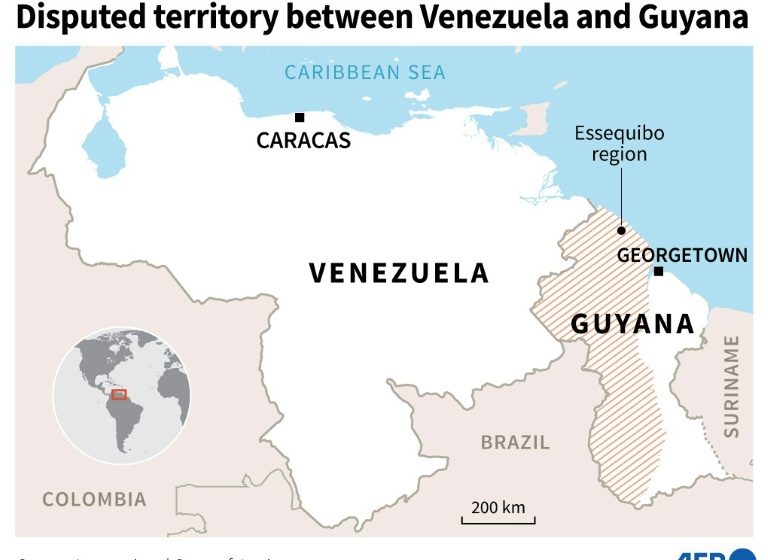Guyana tells UN top court of ‘existential’ threat over Venezuela vote

Disputed territory between Venezuela and Guyana
The Hague – Guyana said Tuesday it faced an “existential” threat from a planned referendum by Venezuela on whether to annex a disputed oil-rich border region, and urged the United Nations’ top court to “urgently” stop the vote.
Venezuela has for decades laid claim to the Essequibo region which is administered by Guyana, making up more than two-thirds of its territory and home to 125,000 of its 800,000 citizens.
The dispute has intensified since ExxonMobil discovered oil in Essequibo in 2015.
Caracas plans a referendum on December 3 calling into question a 1899 decision by an arbitration tribunal that fixed the border with Guyana — a former colony of both Britain and the Netherlands.
“It is not an exaggeration to describe the current threat to Guyana as existential,” said Carl Greenidge, a former minister representing the country at the International Court of Justice (ICJ) in The Hague.
“I cannot stress enough the urgency of the situation that brought us here today,” he added, with Guyana risking the “irreparable and potential permanent loss” of its rights.
Caracas is due to address the court on Wednesday, but Vice President Delcy Rodriguez told Venezuelan TV from The Hague that Guyana had “lied and manipulated” in its presentation to the court.
“Guyana never ceases to amaze us. We are really very surprised because not only are they the heirs of a territory that the UK had stolen from Venezuela, but they also inherited that… imperialist and colonialist arrogance,” she said.
In the referendum, Venezuelans will be asked whether or not to reject the 1899 agreement, which Caracas says was “fraudulently imposed”.
Also on the ballot is whether Venezuela should reject ICJ jurisdiction over the dispute, and whether or not to grant Venezuelan citizenship to the people of an annexed Essequibo.
Guyana says the referendum would pave the way for Venezuela to “unilaterally and illegally” seize Essequibo.
The claim has become potentially all the more combustible due to a “significant” new oil discovery in the region last month, adding to Guyana’s reserves of at least 10 billion barrels — more than Kuwait or the United Arab Emirates.
Tiny Guyana has the world’s biggest reserves of crude per capita, while its neighbor sits on the largest proven reserves overall.
Guyana urged the court to force Venezuela to halt the referendum “in its present form” and to refrain from any actions to take control of the Essequibo territory.
Only the court stands in the way of “chaos that threatens the peace and security of Guyana and the Caribbean region and beyond”” said Greenidge.
Paul Reichler, a top lawyer representing Guyana, told the court that “military preparations were already underway” to enforce the referendum result.
But Rodriguez dismissed these claims, saying a recent military mobilization was to prepare for the referendum.
The ICJ rules on disputes between states but while its decisions are legally binding, it has no power to enforce them.
